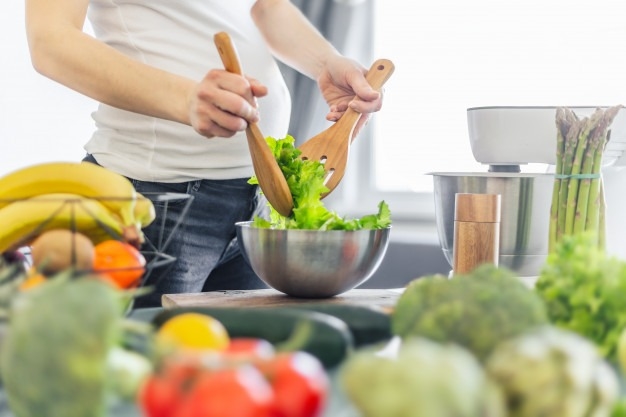
Iodine – An Essential Nutrient For a Healthy Pregnancy
8 Mar 2020 | 5 min Read
Babychakra
Author | 1369 Articles
This article was first published on www.TataNutrikorner.com and is authored by nutritionist Kavita Devgan.
Malnutrition can be very deceptive. Not many understand that being malnourished during a pregnancy is not just about not getting enough macronutrients such as protein and calories in the diet, but it can also mean chronic micronutrient deficiencies. Due to lack of information and the fact that the symptoms are not that clear, micronutrient deficiencies often stay undetected for long (unlike calorie and protein deficiencies) and thus cause huge damage.
Iodine, in fact, is one such micronutrient mineral that a lot many of us tend to be deficient in, and according to WHO, lack of iodine (along with vitamin A and iron) represents a major threat to the health and development of populations the world over, particularly children and pregnant women in low-income countries.
Together, all of us need to be particularly careful in India as there is very little iodine in the soil here, and also because our diets are majorly grain- and plant based – so while they are high in macronutrients like carbohydrates, fats and proteins, they are very low in micronutrients. In fact those who are vegetarian and vegan (who don’t consume dairy) need to be particularly careful, especially women, as their needs tend to be higher.
Why do we need iodine?
Iodine is necessary to make thyroid hormones that regulate growth, development and metabolism. Its deficiency can lead to hypothyroidism, a condition where the thyroid is under active—and the body can’t make enough of the thyroid hormones to keep the body running efficiently.
Often along with low thyroid hormone levels, anaemia too may develop which corrects itself when your hypothyroidism is treated. Anaemia is a problem for both men and women in India, but it is particularly high for women, who have a greater need for iron.
Iodine deficiency could also thin your hair, dry your skin, and make you feel cold, tired, constipated, and depressed. Plus, you might gain weight more easily. Excessive hair loss is in fact a very apparent yet often missed out symptom of iodine deficiency. Iodine also regulates the texture of hair – deficiency shows up in dry and brittle strands.
Pregnant and lactating women (as babies get iodine through breast milk) are at a high risk of iodine deficiency because they need to consume enough to meet their own daily needs, as well as the needs of their growing baby. Not consuming enough iodine during pregnancy and lactation can affect both the mother and baby as iodine protects the developing foetus from brain damage (iodine deficiencies can reduce IQ by an average of 13 IQ points) and its deficiency may lead to stunted physical growth, irreversible brain damage, including mental retardation, for the child. Iodine deficiency during pregnancy has also been associated with ADHD in children. Plus, mothers who are severely iodine deficient could also be at risk for miscarriage and stillbirth. Young children too need to prevent from being affected by IDD (Iodine Deficiency Disorders) for better cognitive development for better school performance, and increased energy (by reducing anaemia).
Symptoms – at a glance
- Swelling in the front of the neck (called goitre)
- Unexpected weight gain
- Fatigue and weakness
- Anxiety and depression
- Hair fall
- Dry flaky skin
- Feeling colder than usual
- Changes in heart rate
- Trouble remembering and learning
- Heavy and irregular menstrual bleeding
How to get enough iodine?
Although the total requirement of iodine for an adult (about 150 mcg) is not much, it is necessary for iodine to be included in our daily diet as our body does not make iodine nor does it have any storage organ for the mineral. Food sources of iodine are spinach, shrimp, tuna, seaweeds (such as kelp), egg, yoghurt, prunes, non-milled and unpolished rice and grains, and garlic, but it is difficult to get enough just from the food sources. Luckily though, the deficiency is easy to prevent by adding just a dash of iodised salt to our food can help meet the requirement. So, don’t take any chances with that. Always use iodised salt in your meals to fulfill iodine requirements. Consult your doctor to ensure that you are consuming the right amount of salt through your diet to avoid any further health complications.
DISCLAIMER
The views and opinions expressed, and assumptions & analysis presented in this content piece are those of the author(s) and do not necessarily reflect the official policy or position of any other agency, organization, employer or company. The information, including but not limited to, text, graphics, images and other material contained on this website are for informational purposes only. The purpose of this website is to promote broad consumer understanding and knowledge of various health topics. It is not intended to be a substitute for professional medical advice, diagnosis or treatment. Always seek the advice of your physician or other qualified health care provider with any questions you may have regarding a medical condition or treatment and before undertaking a new health care regimen, and never disregard professional medical advice or delay in seeking it because of something you have read on this website.
A


Related Topics for you
Suggestions offered by doctors on BabyChakra are of advisory nature i.e., for educational and informational purposes only. Content posted on, created for, or compiled by BabyChakra is not intended or designed to replace your doctor's independent judgment about any symptom, condition, or the appropriateness or risks of a procedure or treatment for a given person.
